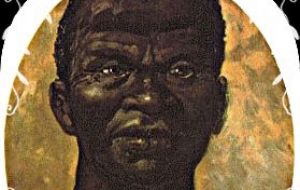MercoPress. South Atlantic News Agency
Brazil commemorates Black Consciousness Day recalling fugitive slaves’ leader
 Zumbi dos Palmares, a symbol for Afro-Brazilians
Zumbi dos Palmares, a symbol for Afro-Brazilians Hundreds of cities, towns and villages throughout Brazil commemorated Saturday Black Consciousness Day with different festivities and cultural activities. Brazil is considered the second Black Country in the world behind Nigeria, with 75.8 million African-Brazilians and is still exposed to the consequences of racial discrimination.
A hundred twenty two years after the abolition of slavery in 1888, Brazil recalls and honours on November 20th “Zumbi dos Palmares”, the last chief of a republic of fugitive slaves.
Killed on November 20, 1695 by the big landowners of the time he has become a symbol of resistance against slavery and has only lately been recalled as such.
According to Brazil’s statistics office, IBGE, of the 10% poorest and indigent Brazilians, 74% are black or coloured.
Afro-Brazilian organizations admit that some progress has been achieved by Afro-Brazilians in publicity or in less-demeaning roles in the country’s famous soap-opera industry. Similarly the colour of skin is less linked to household cleaning and maintenance services.
In Rio do Janeiro Black Consciousness Day inspired three plays in local theatres, with one of them particularly touching. ”The whip revolt” occurred a century ago, 22 November 1910 when a black officer from the Brazilian navy, Joao Candido, the son of former slaves and crew members of the cruiser “Minas Gerais” mutinied in the bay of Rio do Janeiro.
Candido and the 1.173 men on board threatened to bombard the city with the powerful guns and cannons of the cruiser unless the long established practice of corporal punishment and whip lashing were not abolished by the navy.
It was all triggered when a crewmember was sentenced to a punishment considered exaggerated: instead of the customary 25 whip lashes he was to receive 250 lashes.
United States also adhered to the celebration with a message from the State Department.
“The United States Government and the American people congratulate the people of Brazil as they recognize Black Consciousness Day, also known as Zumbi dos Palmares Day, on November 20. The life of Quilombo leader Zumbi and his unrelenting struggle against slavery stands as an enduring symbol of freedom and justice.
“Today, both Brazil and the United States recognize the important contributions of Afro-descendants in our societies and the imperative of combating discrimination, which has negatively impacted both of our countries. Just last month, our governments, in partnership with civil society and our private sectors, met for the third time in Salvador da Bahia under the historic U.S. – Brazil Joint Action Plan to Eliminate Racial and Ethnic Discrimination and Promote Equality. Together we are celebrating the diversity of our heritage and developing and sharing best practices to ensure equal opportunity for Afro-descendants and indeed all citizens of our nations.
“On this significant day, we congratulate the people of Brazil and look forward to a long and fruitful partnership as, together, we provide leadership and examples of democracy, diversity, and social justice to our Hemisphere and to the world”.




Top Comments
Disclaimer & comment rulesCommenting for this story is now closed.
If you have a Facebook account, become a fan and comment on our Facebook Page!